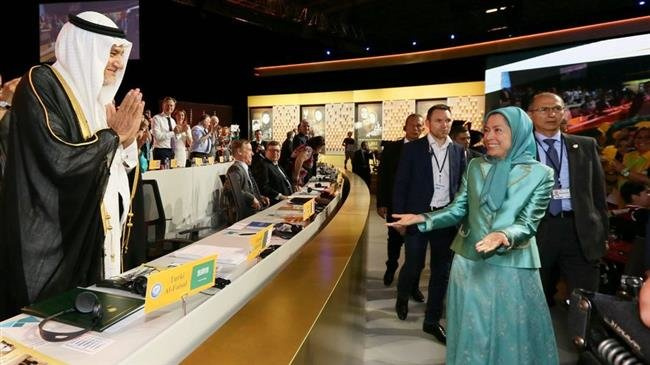Iran’s Regional Rivals Fund MEK: Paul Pillar

(Photo: Prince Turki bin Faisal Al Saud (L) greets Maryam Rajavi, chief of the MKO terror group during a gathering in Paris in July 2016.)
Professor Paul Pillar, who was CIA intelligence analyst for 28 years, says that “A rationale for removing the MEK from the U.S. terrorism list was that in recent years the group has not been involved in killing Americans.”
Pillar says terrorist group is still a terrorist group even if the blood it spills is not American blood. The MEK certainly has been involved in lethal political violence since 2009.
He also adds that “The sources of funds always have been unclear. The most likely sources are states that are regional rivals of Iran.”
Following is the text of the interview:
Q: Why Obama administration removed Mujahedin-e Khalq from a U.S. terrorism list and Trump administration seriously support of this terrorist group.
A: This is not the first time--nor will it be the last--that decisions to add or remove groups from the U.S. list of foreign terrorist organizations have reflected politics and policy and have not been the result of an objective examination of the nature of the group. The MEK's removal from the list came after a prolonged and well-financed lobbying campaign that succeeded in swaying politicians in both major parties, including many who have at most only slight knowledge of what the MEK has done.
Q: Trump administration support terrorist group Mujahedin-e Khalq (MEK) as a democratic alternative to the current Iranian political system. Why Trump administration support a group that have not any social base among Iranians and Iranian know them as a terrorist group?
A: The Trump administration's policy toward Iran consists of using every any means available to hurt and pressure Iran, while paying little attention to the nature of the means used or to the negative effects of using them. Although some of the administration's rhetoric sounds as if greater democracy in Iran is one of its objectives, democracy plays little role in the administration's decisions--as indicated, for example, by its strong siding with the regime in Saudi Arabia, which is decidedly non-democratic. If the MEK is opposed to the current political order in Tehran, that's all that matters to the Trump administration.
Q: As you mentioned in your article in LobeLog many activities of Mujahedin-e Khalq need much money. Which countries or group may help to them?
A: The sources of funds always have been unclear. The most likely sources are states that are regional rivals of Iran.
Q: Mujahedin-e Khalq ideology is mixture of a version of Islam and Marxism. They also operate as a terrorist group. Why U.S. as a leading democratic country in the world support such a group? This is controversial when we consider that foreign policy according to the liberalism is the continuation of domestic policy and U.S. domestic policy is based on free values and liberalism. How U.S. government solve this contradiction?
A: The Trump administration clearly is not worrying about such things, because it has given ample other indications that it gives little importance to such values in conducting foreign relations. This became quite clear recently with its reaction to the killing of Saudi dissident Jamal Khashoggi, in which President Trump in effect said that such a murder can be excused as long as the Saudis buy U.S. weapons.
Q: According to the RAND report, Mujahedin-e Khalq terrorist activities have continued by 2009. But U.S. acclaimed that there are no terrorist activity by this group in 10 last years ago. Which one is right?
A: A rationale for removing the MEK from the U.S. terrorism list was that in recent years the group has not been involved in killing Americans. The law governing the list could be construed that way, although more often, decisions on listing and delisting are not made from such a narrow perspective. A terrorist group is still a terrorist group even if the blood it spills is not American blood. The MEK certainly has been involved in lethal political violence since 2009.
Source: Mehr News

